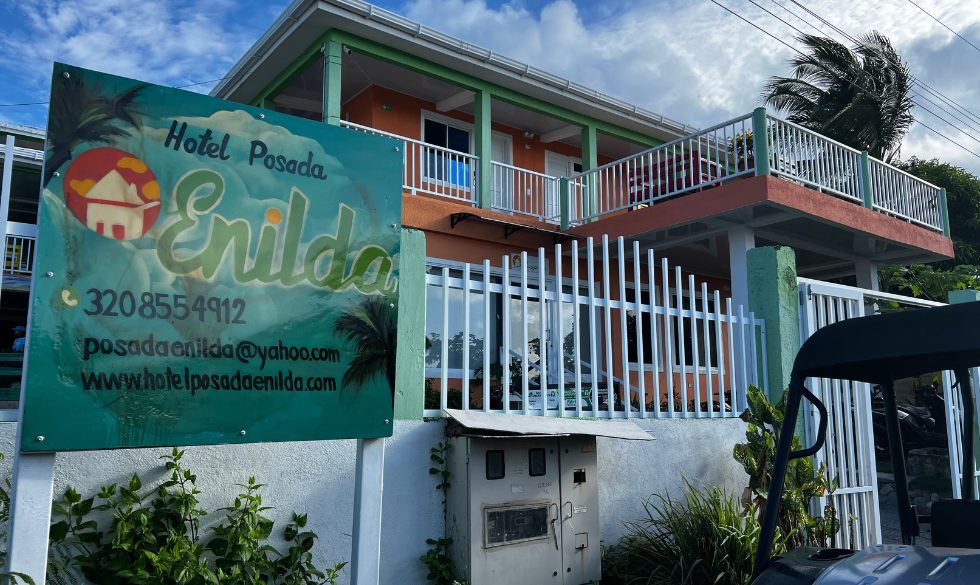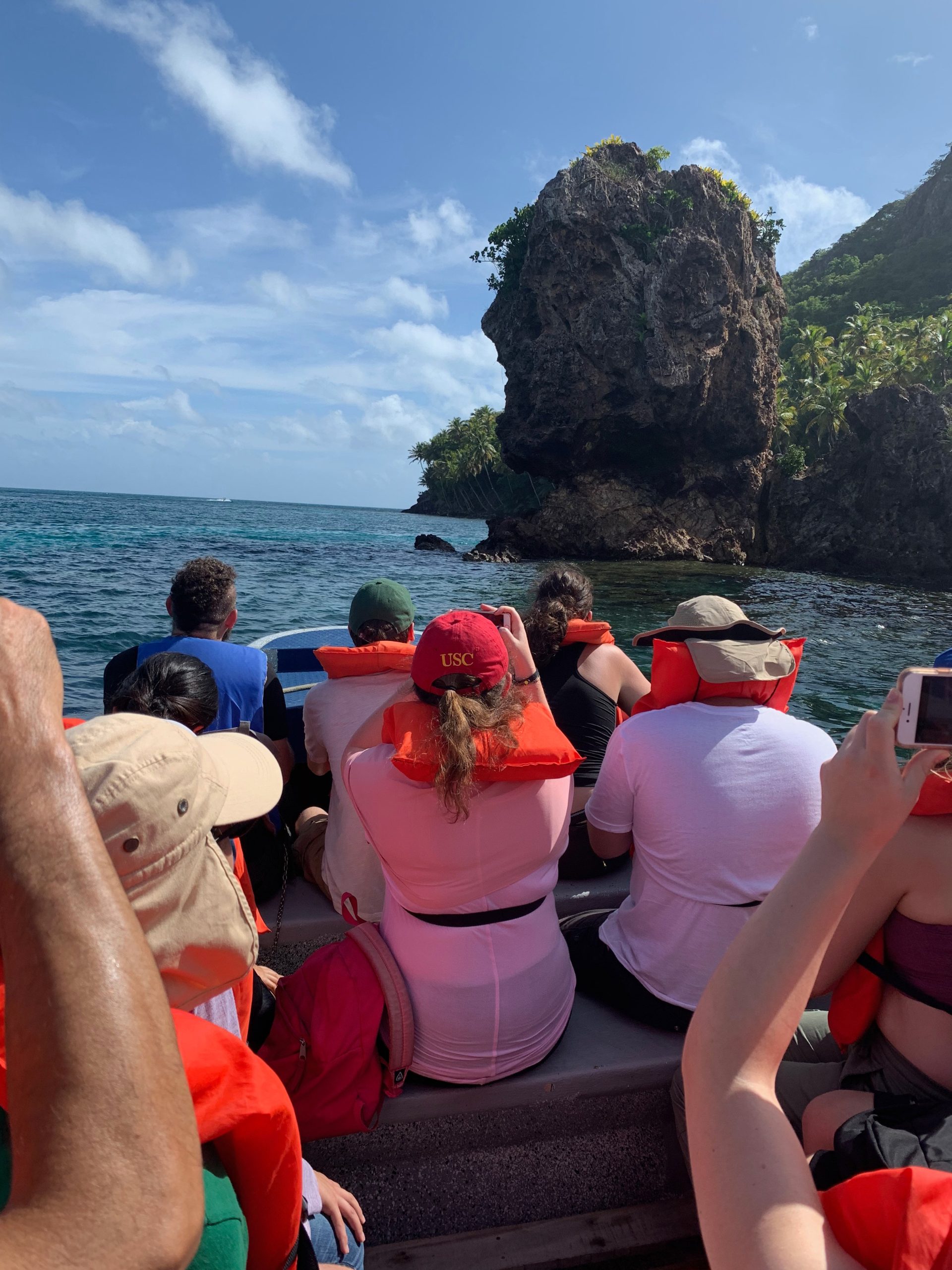Overview
Embark on a thrilling summer adventure that combines history, culture, and hands-on research on the captivating Colombian islands of Old Providence and Santa Catalina. Located in the heart of a stunning UNESCO biosphere reserve in the Western Caribbean, these islands boast a rich cultural tapestry shaped by their past as a global trade hub and centuries of shifting power dynamics, from English and Spanish administrations to encounters with pirates and privateers. Today, the islands are still home to the Native Raizal descendants of the original English colonists, enslaved Africans, and self-emancipated Maroon villagers. Join IFR’s community-led project by digging into the islands’ complex heritage and helping to preserve Native Raizal oral histories.
Field school highlights:
- Untangle the islands’ settlement timeline through hands-on archaeological field research.
- Connect with the vibrant local community and make a real impact by documenting their unique stories, art, and culture.
- Explore the stunning landscapes of the Western Caribbean.
| Course Details | |
|---|---|
| Course Dates | June 7-July 2, 2025 |
| Course Type | Historical Archaeology, Ethnography & Community Oriented Outreach |
| Instructors | Dr. Tracie Mayfield |
| Credits* | 8 semester (12 quarter) |
| Apply By | April 15 |
| Fees Due By | April 15 |
| Program Fees | (2025) |
|---|---|
| Tuition | $4,570 |
| Transcript Fee* | $300 |
| Health & Evacuation Insurance | $130 |
| Room & 1/2 Board | $1,430 |
| TOTAL: | $6,430 |
*This program may accept students past the deadline. Email admissions@ifrglobal.org for more information.
Instructors
The directors welcome emails and inquiries about the research elements of this project. More general information (tuition, health insurance, and payment schedule) can be found under the ‘Students’ tab above. Any further questions may be addressed to IFR staff. Additional details about research, course schedule, travel, accommodation, and safety can be found on the syllabus. Contacting the directors or the IFR office is encouraged and appreciated. It may help you determine if this field school is a good fit for you.
Testimonials
Field School testimonials coming soon!
Payment & Student Fees
Application Fee: There is a $45 fee to submit an online application.
Deposit Payment: A nonrefundable $500 deposit is due within 3 weeks of program acceptance in order to secure your place. The remainder of your program fees are due by the deadline indicated under “Course Details”.
*Transcript Fee & Academic Credit Opt Out: If you wish to participate in an IFR field school without earning academic credits, you will not be charged a transcript fee.
For more information about payment, fees, and policies, please see details under our Payment & Finances and Withdrawal and Cancellation Policy pages.
Accommodations
Students and faculty will be housed at Posada Enilda Bed and Breakfast located in the south of the Island in an area called Bottom House. Students do not need to reserve their own rooms, this will already be taken care of before they arrive. This posada is a fully modern facility with comfortable outdoor seating areas, shared dining room, and other amenities, such as air-conditioning, in- room safes, and personal refrigerators, and is extremely comfortable. The husband and wife owners are excited about hosting the students and we have enjoyed our stays in past years, immensely. Security cameras monitor the grounds and the main gate is locked at night. Old Providence is a safe island, with little serious crime.
Room and board at the Posada includes breakfast every day, and lunch Monday-Saturday, which will be served in the field or in the dining area at Posada Enilda. Dinners will not be provided by the program, but there are restaurants nearby and food can be ordered and delivered to the Posada. Additionally, grocery stores are available on the Island where students can purchase food; each room has a refrigerator where meal and snack supplies can be stored.
The owners of the Posada can meet most dietary needs (vegetarians, vegans, and lactose intolerant), other than Kosher, although if given enough advance time to order supplies and with specific instructions/ consultation, the Posada may be able to meet Kosher needs as well, so please contact the Director if this is of interest to you. Laundry services are also offered at the Posada; which you can request when you check in after arriving on site.
Rooms are cleaned by the Posada staff every other day, but students are required to take steps to ensure proper daily cleaning such as wiping down shared areas (e.g. bathroom, desks, door handles, etc.) multiple times a day and depositing trash in the outside receptacles each time you leave your room. Students should either bring disinfecting products or plan on buying cleaning materials soon after arriving.
There is a laundry facility onsite where you can do your own laundry for free. If you would like laundry services (pick-up and delivery outside your room), you can request and pay for this service at the front desk.


Travel Info
Natural disasters, political changes, weather conditions and various other factors may force the cancellation or alteration of a field school. IFR recommends students only purchase airline tickets that are fully refundable and consider travel insurance in case a program or travel plans must change for any reason.
General information for this program is below, but keep in mind we will discuss any updated travel information and regulations during the required program orientation, which could affect travel plans.
Students can fly through Bogotá, Colombia; Belize City, Belize; or Panama City, Panama. We recommend Panama City because the flights are generally less expensive than going to Bogotá and more frequent than going through Belize City. The Panama City Airport is a modern, well-appointed facility and the hub for Copa Airlines.
From either Bogotá, Belize City, or Panama City students will need to fly to San Andrés Island (Gustavo Rojas Pinilla International Airport – ADZ) in Colombia.
Getting to this point is very straightforward and can be booked through any of the major travel websites.
Students can then either fly to El Embujo Airport (PVA) or take a boat from San Andrés Island to Providence Island. SATENA, San Germán Express and Decameron airlines fly twice daily and the flight takes 20 minutes. Alternatively, a catamaran service by Conocemos Navegando sails early in the morning from San Andrés five times a week: Mon, Wed, Thurs, Fri and Sun. The catamaran departs San Andrés at 8:00am and travel time is 3.5 hours; return trips to San Andrés depart at 2:30pm. If students need to spend the night on San Andrés we recommend the Hotel Casablanca, which is located on the beach.
Program staff will meet students either at the Old Providence Island airport or catamaran seaport.
If you missed your connection or your flight is delayed, please call, text or email Program Director immediately. A local emergency cell phone number will be provided to all enrolled students.
Visa Requirements
All U.S. citizens who do not also hold Colombian citizenship must present a valid U.S. passport to enter and depart Colombia. U.S. citizens traveling to Colombia do not need a Colombian visa for a tourist stay of 90 days or less. Travelers entering Colombia are sometimes asked to present evidence of return or onward travel, usually in the form of a plane ticket. The length of stay granted to travelers is determined by the Colombian immigration officer at the point of entry and will be stamped in your passport. Before the visa expires, travelers may request an extension of up to 90 days.
All persons entering Colombia are assessed a fee of USD $40 or its equivalent in Colombian Pesos (COP) in addition to the airfare or boat fare. Where this fee is collected may vary based on the students’ point of entry into the country. Students are not assessed this fee when leaving Providence Island.
Citizens of countries other than the United States are asked to check the embassy website page at their home country for specific visa requirements.















